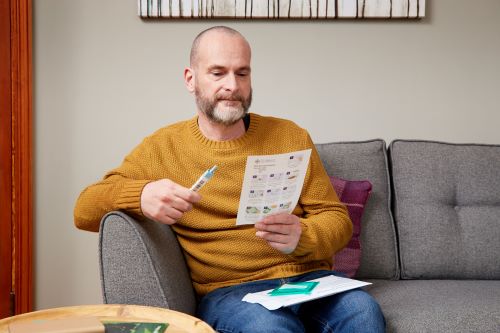Testing for blood in your poo using FIT
FIT (Faecal Immunochemical Test) is a test that looks for blood in a sample of your poo. It looks for tiny traces of blood that you might not be able to see, and which could be a sign of cancer.
Traces of blood in your poo can be caused by other medical conditions and doesn’t necessarily mean you have cancer. But if it is cancer, finding it at an early stage means treatment is more likely to work.
This information is about using the FIT test for people who have symptoms that could be caused by bowel cancer. We have separate information about using FIT for the Bowel Cancer Screening Programme for people who don’t have symptoms of bowel cancer.
What is FIT?
The Faecal Immunochemical Test (FIT) looks for tiny traces of blood in your poo that are too small to see. The test recognises human blood. This means it is less likely to pick up other blood in your poo that might have come from something you ate.
Why do I need to do a FIT test?
Your doctor might give you this test as part of the investigation for your symptoms. The FIT results help your doctor decide whether to refer you urgently for more tests.
You might have to do this test if you have symptoms which could be caused by bowel cancer.
Symptoms might include:
- a change in your normal bowel habit, such as looser poo, pooing more often or constipation
- a lower than normal level of red blood cells (anaemia)
unexplained weight loss 
- tummy (abdominal) pain
How do I do a FIT test?
You do this test yourself at home. You only need to collect one sample of poo.
Your doctor will give you the test. Or they will arrange for you to get one in the post.
The easiest way to collect the sample is to use an old plastic container, line it with toilet paper and put it in the toilet. And then have a poo into the container.
Do not wee into the container. And do not let your poo touch the water or the toilet.
Once you have collected your poo:
- dip the stick from the testing kit in the poo
- make sure the end is covered with poo
- put the stick back in the tube and twist it shut
- write the date on the side of the tube
- put the tube into the sample bag
The test only needs a small amount of poo. Don’t add extra to the stick because the laboratory may not be able to process it. This means you would have to do the test again.

View a leaflet about tips for collecting your poo
After the test
Your doctor will give you clear instructions about what to do with your sample of poo.
You might return the sample to your GP or the hospital. Or they might give you an envelope and ask you to send it in the post.
Getting your results
You should get your results within 1 or 2 weeks.
Waiting for results can make you anxious. Ask your doctor or nurse how long it will take to get them. Contact the doctor who arranged the test if you haven’t heard anything after a couple of weeks.
There are different results you can get after the FIT. These include:
Blood in your poo
You will need further tests if there is blood found in your poo. Your doctor might call this FIT positive.
This doesn’t mean that you have cancer. Blood in your poo can be caused by cancer or by other medical conditions.
You usually have a test to look at the inside of your large bowel. This is called a colonoscopy.
No blood in your poo
This means that no blood was found in your poo. Your doctor might call this FIT negative.
For most people this means that they don’t have cancer. But a normal FIT result doesn't completely rule out cancer. Some people can have cancer and a normal FIT result.
It’s important to go back to your GP if your symptoms continue, change, or get worse even if you have normal test results. Some people will need to have further tests.



